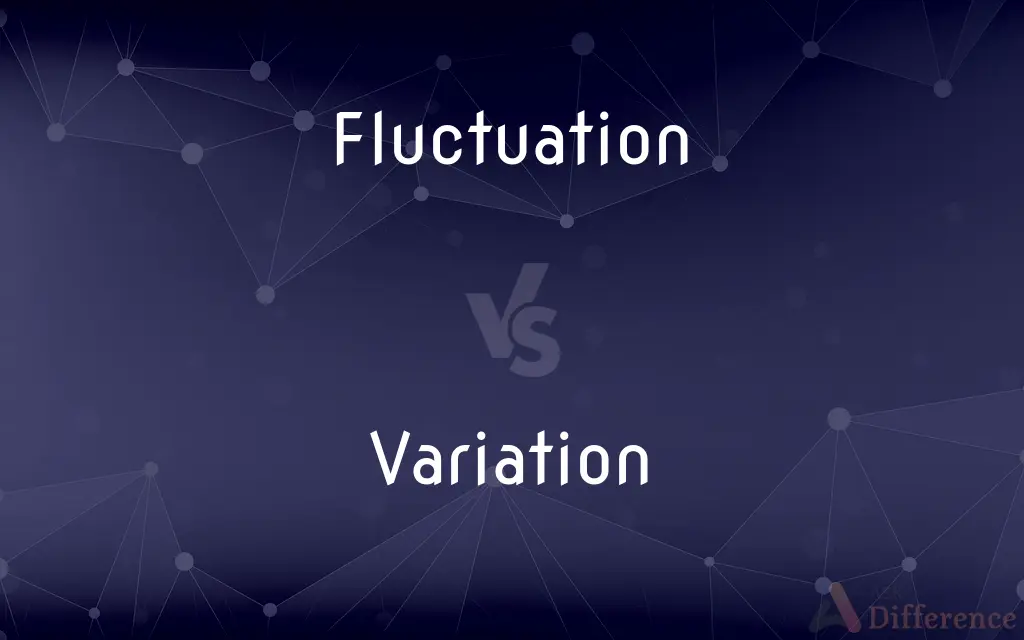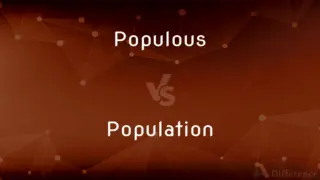Fluctuation vs. Variation — What's the Difference?
Edited by Tayyaba Rehman — By Urooj Arif — Updated on March 31, 2024
Fluctuation refers to irregular or unpredictable changes within a defined range, often short-term, while variation encompasses a broader range of differences or changes, potentially systematic or random, over time or across conditions.

Difference Between Fluctuation and Variation
Table of Contents
ADVERTISEMENT
Key Differences
Fluctuation implies an unpredictable change that often occurs within a short period and is usually reversible. These changes can be seen in economic markets, where prices fluctuate based on supply, demand, investor sentiment, and external factors. On the other hand, variation refers to the diversity or differences that occur in any entity or environment over time or space. For instance, genetic variation in a population contributes to differences in traits among individuals, affecting evolution and survival.
While fluctuation often suggests temporary or cyclical changes, such as the daily fluctuation in temperature, variation encompasses a wider range of differences, including those that are permanent or structural, like the variations in species caused by evolution. Whereas fluctuations can return to a previous state or follow a predictable pattern, variations can indicate a one-time change or a permanent difference.
In the context of data analysis, fluctuation is used to describe the volatility or variability in data points over a short period, often without implying a long-term trend. Conversely, variation is a broader term that includes both systematic changes, which follow a discernible pattern, and random changes, which do not, across the entire dataset or population studied.
Understanding the difference between fluctuation and variation is crucial in fields like statistics, where the former may refer to short-term variability within a set range, and the latter may encompass the overall dispersion or range of data, including outliers and anomalies. This distinction helps in applying appropriate analytical techniques and interpreting data correctly.
Despite their differences, both fluctuation and variation are fundamental concepts in analyzing patterns and changes in various fields, from finance to biology. Recognizing whether changes are fluctuating within a range or represent a variation helps professionals devise strategies, make predictions, and understand underlying causes.
ADVERTISEMENT
Comparison Chart
Definition
Irregular or unpredictable changes within a specific range, often short-term.
Differences or changes that are broader and can be systematic or random, potentially permanent.
Scope
Typically narrower, focusing on short-term changes.
Broader, encompassing all types of differences, including long-term changes.
Predictability
Often unpredictable, can be cyclical.
Can be either predictable (systematic) or unpredictable (random).
Reversibility
Changes are often reversible and can return to a previous state.
Changes can be irreversible, indicating permanent differences.
Contexts
Commonly used in economics, finance, and environmental studies.
Applies widely across various fields, including biology, statistics, and sociology.
Compare with Definitions
Fluctuation
Fluctuation refers to irregular changes within a certain range.
The stock market experienced daily fluctuations this week.
Variation
Variation means differences or changes that are broader than fluctuations.
Genetic variation within a species can drive evolution.
Fluctuation
Fluctuations can be cyclical.
Seasonal fluctuations in hotel prices are common in tourist destinations.
Variation
It is applicable across different scales.
Variations in climate patterns have global impacts.
Fluctuation
It indicates short-term variability.
Temperature fluctuations can affect energy consumption patterns.
Variation
It includes both systematic and random changes.
Variation in test scores reflects both teaching quality and student effort.
Fluctuation
Fluctuation implies a lack of predictability.
Fluctuations in customer demand complicated the supply chain planning.
Variation
Variations can be predictable or not.
Annual variations in rainfall patterns affect agricultural productivity.
Fluctuation
Often, fluctuations are reversible.
The fluctuations in currency value were corrected by the central bank's interventions.
Variation
Variation can be permanent.
Cultural variations shape societal norms and behaviors.
Fluctuation
An irregular rising and falling in number or amount; a variation
Fluctuations in the yearly values could be caused by a variety of factors
The current fluctuation in energy prices
Variation
A change or slight difference in condition, amount, or level, typically within certain limits
Regional variations in house prices
The figures showed marked variation from year to year
Fluctuation
To vary irregularly, especially in amount
School enrollment has fluctuated from year to year.
Variation
A different or distinct form or version of something
Hurling is an Irish variation of hockey
Fluctuation
A motion like that of waves; a moving in this and that direction.
The fluctuations of the sea
Variation
The act, fact, or process of varying.
Fluctuation
A wavering; unsteadiness.
Fluctuations of opinion
Fluctuations of prices
Variation
The extent or degree to which something varies
A variation of ten pounds in weight.
Fluctuation
In medicine, a wave-like motion or undulation of a fluid in a natural or abnormal cavity (e.g. pus in an abscess), which is felt during palpation or percussion.
Variation
Something different from another of the same type
Told a variation of an old joke.
Fluctuation
A motion like that of waves; a moving in this and that direction; as, the fluctuations of the sea.
Variation
Magnetic declination.
Fluctuation
A wavering; unsteadiness; as, fluctuations of opinion; fluctuations of prices.
Variation
(Biology) The existence within a species or other group of organisms of differences in form, function, or behavior, especially when hereditary.
Fluctuation
The motion or undulation of a fluid collected in a natural or artifical cavity, which is felt when it is subjected to pressure or percussion.
Variation
(Mathematics) A function that relates the values of one variable to those of other variables.
Fluctuation
A wave motion;
The fluctuations of the sea
Variation
A form that is an altered version of a given theme, diverging from it by melodic ornamentation and by changes in harmony, rhythm, or key.
Fluctuation
An instance of change; the rate or magnitude of change
Variation
One of a series of forms based on a single theme.
Fluctuation
The quality of being unsteady and subject to fluctuations;
He kept a record of price fluctuations
Variation
A solo dance, especially one forming part of a larger work.
Variation
The act of varying; a partial change in the form, position, state, or qualities of a thing.
Variation
A related but distinct thing.
When the process didn't work, we tried a variation.
All of his soups are variations on a single recipe.
Variation
(nautical) The angular difference at the vessel between the direction of true north and magnetic north.
Magnetic declination
Variation
(board games) A line of play that differs from the original.
Variation
(music) A technique where material is repeated with alterations to the melody, harmony, rhythm, timbre, texture, counterpoint or orchestration; but with some invariant characteristic, e.g. a ground bass.
Variation
(genetics) The modification of a hereditary trait.
Variation
(astronomy) Deviation from the mean orbit of a heavenly body.
Variation
The act of varying; a partial change in the form, position, state, or qualities of a thing; modification; alteration; mutation; diversity; deviation; as, a variation of color in different lights; a variation in size; variation of language.
The essences of things are conceived not capable of any such variation.
Variation
Extent to which a thing varies; amount of departure from a position or state; amount or rate of change.
Variation
Change of termination of words, as in declension, conjugation, derivation, etc.
Variation
Repetition of a theme or melody with fanciful embellishments or modifications, in time, tune, or harmony, or sometimes change of key; the presentation of a musical thought in new and varied aspects, yet so that the essential features of the original shall still preserve their identity.
Variation
One of the different arrangements which can be made of any number of quantities taking a certain number of them together.
Variation
An instance of change; the rate or magnitude of change
Variation
An activity that varies from a norm or standard;
Any variation in his routine was immediately reported
Variation
A repetition of a musical theme in which it is modified or embellished
Variation
Something a little different from others of the same type;
An experimental version of the night fighter
An emery wheel is a modern variant of the grindstone
The boy is a younger edition of his father
Variation
An artifact that deviates from a norm or standard;
He patented a variation on the sandal
Variation
The angle (at a particular location) between magnetic north and true north
Variation
(astronomy) any perturbation of the mean motion or orbit of a planet or satellite (especially a perturbation of the earth's moon)
Variation
(biology) an organism that has characteristics resulting from chromosomal alteration
Variation
(ballet) a solo dance or dance figure
Variation
The act of changing or altering something slightly but noticeably from the norm or standard;
Who is responsible for these variations in taxation?
Common Curiosities
What is variation?
Variation encompasses a wide range of differences or changes, which can be systematic or random, and may indicate long-term differences across conditions or entities.
How do fluctuation and variation differ in context?
Fluctuation is commonly associated with short-term, reversible changes in specific contexts like finance or weather, whereas variation applies to a broad spectrum of differences in various fields, including biology and sociology.
What is fluctuation?
Fluctuation refers to unpredictable, often short-term changes within a defined range, typically without indicating a permanent trend.
Can fluctuations be predicted?
Fluctuations are generally unpredictable and irregular, though some cyclical fluctuations can be anticipated, such as those related to seasons or market cycles.
How do fluctuations relate to trends?
Fluctuations can occur within the context of a broader trend but do not necessarily indicate a long-term direction by themselves.
Is variation always permanent?
Not always. While variation can indicate permanent differences, it also encompasses temporary or systematic changes, reflecting a broader concept than fluctuation.
What causes variations in data?
Variations in data can be caused by a multitude of factors, including changes in the environment, different populations being studied, or random events.
What role does variation play in evolution?
Genetic variation is fundamental to evolution, as it provides the raw material for natural selection to act upon, leading to adaptations and species diversity.
How are fluctuations managed in finance?
Financial markets attempt to manage fluctuations through various instruments and strategies, including hedging and diversification, to mitigate risk.
Why is understanding variation important in statistics?
Understanding variation is crucial in statistics to analyze data accurately, identify patterns, and make informed decisions based on the range and distribution of data points.
Share Your Discovery

Previous Comparison
Blush vs. Mauve
Next Comparison
Populous vs. PopulationAuthor Spotlight
Written by
Urooj ArifUrooj is a skilled content writer at Ask Difference, known for her exceptional ability to simplify complex topics into engaging and informative content. With a passion for research and a flair for clear, concise writing, she consistently delivers articles that resonate with our diverse audience.
Edited by
Tayyaba RehmanTayyaba Rehman is a distinguished writer, currently serving as a primary contributor to askdifference.com. As a researcher in semantics and etymology, Tayyaba's passion for the complexity of languages and their distinctions has found a perfect home on the platform. Tayyaba delves into the intricacies of language, distinguishing between commonly confused words and phrases, thereby providing clarity for readers worldwide.














































